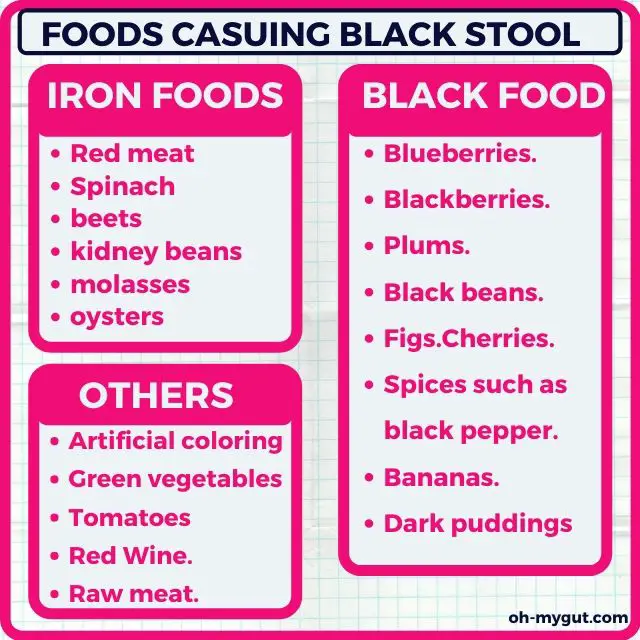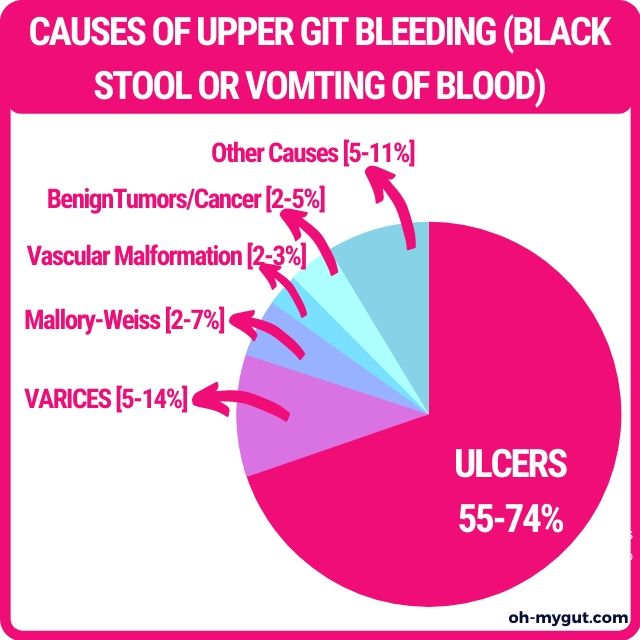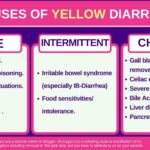Very Dark Brown Stool Almost Black: 3 Causes Explained.
Our content is not intended nor recommended as a substitute for medical advice by your doctor. Use for informational purposes only.
Fast Facts:
Very dark brown stools are often caused by dark foods, food pigments, or medications. However, an almost black stool can indicate bleeding inside your gastrointestinal tract.
Common causes include:
- Dark-colored foods such as blueberries, blackberries, plums, …etc.
- Iron-containing foods such as spinach, red meat, …etc.
- Artificial coloring, green leafy vegetables, tomatoes.
- Medications such as iron supplements and Pepto-Bismol.
- Bleeding inside your gut tract (produces black tarry stool rather than dark brown stool).
- The most common causes of gastrointestinal bleeding are peptic ulcers, esophageal varices, vascular malformations, and malignant tumors.
1- Food.
When you experience very dark brown stools (almost black) with no other symptoms, you should think of simple causes.
Food is the most common cause of stool color changes. Many foods can lead to very dark brown or black stools.
The recent change in your stool color without other symptoms (especially abdominal pain) may indicate that food is the cause.
Common foods that cause very dark brown or almost black stool:
1- Black colored foods and fruits:
- Blueberries.
- Blackberries.
- Plums.
- Black beans.
- Figs.
- Cherries.
- Spices such as black pepper.
- Bananas.
- Dark puddings
2- Iron-containing foods
- Red meat,
- Spinach,
- beets,
- kidney beans,
- molasses,
- and oysters.
3- Artificial coloring
- black licorice.
- Chocolate puddings.
4- Green leafy vegetables: once digested, they turn dark greenish-brown or black.
5- Tomatoes and tomato products.
6- Redowine.
7- Raw or undercooked meat: besides iron, it contains some blood inside the meat fibers.

2- Medications.
** Skip this section if you are not on any medications.**
Some medications can lead to almost black stools (very dark brown). Most commonly, iron-containing supplements. The more the dose of iron, the darker your stool will get.
The two medications that cause very dark brown or black stool.
1- Iron Supplements
Oral treatment of iron deficiency anemia usually requires high doses of iron. The larger the dose of iron, the darker your stool gets.
It can turn to the almost black stool while treating iron deficiency anemia. However, iron also is contained in general tonic supplements.
Tonic supplements (containing multivitamins and minerals) usually contain fewer amounts of iron. But it also can cause very dark brown stool.
Check the iron content of your supplement. If you are unsure about the cause of very dark stool, try to withhold supplements for 3 to 5 days. And watch your stool color; if it reverts to normal, it is due to the iron-containing supplement.
2- Bismus subsalicylates (Pepto-Bismol).
Pepto-Bismol is a medication used to treat diarrhea and gastritis. No need to worry about dark brown or black stool if you take Pepto-Bismol.
The more the dose of Pepto-Bismol, the darker (almost black) your stool will get.
3- Indirect effect of medications (medications that cause gut bleeding).
Medications can indirectly cause almost black stools (melena) by inducing bleeding inside the stomach or intestine.
Two major mechanisms of bleeding:
- Inducing ulcers or injury to the lining of your intestine, which bleeds.
- Preventing normal coagulation of blood (blood-thinning medications) can cause bleeding inside your gut even without apparent injury.
The most commonly used medications that can cause peptic ulcers and bleed into stool are non-steroidal anti-inflammatory drugs (NSAIDs).
A- Examples of Non-steroidal inflammatory drugs:
- Aspirin.
- Diclofenac
- Ibuprofen. (Advil ®)
- Indomethacin (Indocin ®)
- Ketorolac.
- Naproxen.
Pain in the epigastric area (upper central abdominal pain), black stool, and history of NSAID intake suggest bleeding peptic ulcers.
This is a medical emergency. If you have a bleeding peptic ulcer, please seek medical help immediately.
B- Examples of blood-thinning medications (anticoagulants and anti-platelet drugs).
- Warfarin (Coumadin ®)
- Direct oral anticoagulants.
- Injection anti-coagulants. Such as unfractionated heparin and low molecular weight heparins.
- Clopidogrel (Plavix ®)
3- bleeding into your gut.
The most dangerous and unlikely cause of very dark brown stool. Because it is less frequent compared to food and medications.
Also, Bleeding into the upper part of your gut (esophagus, stomach, and early part of small intestine) causes JET BLACK stool rather than a very dark brown stool. Minor and recurrent bleeds can cause black spots or speckles in the stool.
A- common causes of gastrointestinal bleeding include:
- Bleeding from peptic ulcers (stomach or duodenum ulcers) is the most common: in 55-74% of the cases of gut bleeding.
- Varices (dilated veins in the wall of the esophagus or the stomach) in patients with liver diseases: 5-14% of the cases.
- Mallory-Weiss syndrome (severe vomiting attacks that lead to a small tear in the esophagus wall): 2-7%.
- Malformed blood vessels (abnormally dilated vessels in the wall of the gut tract): causes PAINLESS bleeding inside your gut.
- Benign tumors (such as polyps) or malignant tumors (such as gastric or colon cancer): in 2-5% of cases
- Others (5-11%): as overdosing on blood-thinning drugs, swallowing blood (in severe cases of nose bleeding, “epistaxis”).

B- What is the stool appearance of melena (black stools due to bleeding)?
Blood from the upper part of your gut (esophagus, stomach, or duodenum) is usually black (called melena).
Melena is different from a very dark brown stool. It is tarry black, usually with a characteristic offensive smell (rotten meat smell).
The major differences between melena and other causes of very dark brown or almost black stools are summarized in the table below.
| MELENA | OTHER CAUSES | |
| COLOR | Tarry or Jet black. | very dark brown or almost black |
| SMELL | Characteristic foul smells (acidic and ironic smells) | usually no unique changes from your normal stool smell. |
| CONSISTENCY | Usually loose (Tar-like consistency) and sticky. | well-formed, non-sticky |
| FLUSHING | Difficult to flush it away. | Easy to flush |
| COURSE | Sudden onset, rapid deterioration. | Usually, the condition is intermittent stool discoloration (related to foods or drugs) over days or even months. |
| SYMPTOMS OF THE CAUSE | Epigastric pain (peptic ulcer), vomiting of blood (esophageal varices). Weight loss (gastric cancer, colon cancer). May not present. | History of taking block foods, iron supplements, or Pepto-Bismol. |
| SYMPTOMS OF BLEEDING | Usually present: ►Dizziness, fainting, shortness of breath. ►Fast heartbeats. ►Pale, cool, clammy skin. ►Collapse and loss of consciousness in severe cases. | Absent. |
MORE:
C- Can gastric or colon cancer cause dark brown (almost black) stool?
Gastric cancer causes melena (black, tarry stool). Colon cancer commonly causes bleeding in the stool (red or maroon stool rather than black stool). However, minute bleeding from a small colon cancer mass can present with black stools or black spots in the stool.
Very dark brown (uniformly colored) is unlikely to be due to malignancy unless you have risk factors or signs of malignancy (explained below).
When to see a doctor for dark brown (almost black) stools?
- Characteristic tarry, jet-black stool (melena).
- Signs of blood loss (anemia): such as dizziness, shortness of breath, rapid heartbeats, collapse, pale, cold extremities, or even loss of consciousness.
- History of non-steroidal anti-inflammatory drugs or blood-thinning drugs (it is ok to have dark stool when taking Iron or Pepto-Bismol).
- Signs suspicious of malignancy such as significant weight loss (more than 5% of body weight within a few months), anorexia, low-grade fever, unexplained abdominal pain, or blood in stool in age >50.
- Unexplained anemia.
- Family history of colon cancer or familial polyposis.
- Evidence-based
- Written by a doctor.






